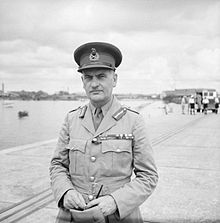Henry Royds Pownall
Sir Henry Royds Pownall , KCB , KBE , DSO , MC (born November 19, 1887 - † June 9, 1961 ) was a British Lieutenant General and one of Winston Churchill's most important military advisers regarding preparations for World War II . Pownall became British "High Commanding Far East" in Singapore at the end of December 1941 and from January 1942 Chief of Staff of ABDACOM under General Archibald Wavell .
Life
Henry Royds Pownall was born the second son of Charles Assheton Whately Pownall , who pioneered the basic Japanese railway network . Pownall's mother took all three of her young children to Japan for a five-year stay, where, in addition to their mother tongue, they were also taught Japanese . Henry Pownall spent his actual school days in his native Great Britain. He attended rugby school in Warwickshire and then went to the Royal Military Academy in Woolwich . After completing his training period, which he completed as one of the best 15 students, he joined the Royal Field Artillery , RFA for short , in 1906 . His first assignment abroad took him to Lucknow in British India with the Royal Horse Artillery . Between 1906 and 1914 he was stationed in various locations in Great Britain and India.
During the First World War , Pownall was mainly used in France and Belgium . In 1917 and 1918 he served as a brigade major in the divisional artillery of the 17th Division. At the end of the war, Pownall was promoted to major . In 1918 he married Lucy Louttit Gray.
Between 1924 and 1925 Pownall taught at the British Artillery School and between 1926 and 1929 he worked at the Staff College in Camberley .
In the 1930s, Henry Pownall worked in various advisory functions in the "Committee for British National Defense". In 1936 he was given command of the artillery school in Larkhill as a brigadier , which he kept until 1938. In the same year, the military leadership made him director of military operations and intelligence in the Ministry of War.
When the Second World War broke out, Pownall went to France with the British Expeditionary Corps as Chief of Staff. During the German campaign in the west in 1940, he earned a great deal of respect.
After the voluntary Home Defense Units (later British Home Guard ) were established, Pownall became their first in command. He held this office very briefly, however, as Winston Churchill was of the opinion that a man with the experience and the skills should be given another, more adequate post. In 1941 Pownall became deputy chief of the Imperial General Staff .
When General Sir Alan Brooke succeeded General Sir John Dill as Chief of the Imperial General Staff in November 1941 , Henry Pownall was designated for a special post. Which this was was still kept secret and only a month after the decision, when Pownall had arrived in Singapore, it was publicly announced that he was the new Commander-in-Chief in the Far East and thus the successor to Air Marshal Sir Robert Brooke-Popham . In January 1942 Pownall became chief of staff of the ABDACOM under General Archibald Wavell.
After the ABDACOM was dissolved and he was promoted to lieutenant general, Pownall came to the command post in Ceylon in April 1942 , which he held until March 1943. He then replaced Sir Henry Maitland Wilson in Persia and Iraq as commander-in-chief . Shortly thereafter, Lord Louis Mountbatten , the Commander in Chief of the Allied Forces in Southeast Asia, appointed him his Chief of Staff. But as early as November 1944, Pownall had to resign from this office due to illness. 1945 Pownall retired from the British Army.
In 1947 Henry Pownall was appointed chairman of the St. John Ambulance Brigade (→ Johanniter-Unfall-Hilfe ). Pownall has continued to work in industry and business, including as chairman of Friary Meux Ltd and a committee member at Lloyds Bank. Pownall's wife Lucy passed away in 1950.
In addition to his professional activities, Pownall was an avid skier , golfer and fly fisherman . His diaries document that he was an anti-Semite . Leslie Hore-Belisha , the war minister who came from a Jewish family, he described in his diary as a mentally less well-off "Jewish boy".
Henry Royds Pownall died on June 9, 1961.
Fonts
-
Brian Bond (Ed.): Chief of staff. The Diaries of Lieutenant-General Sir Henry Pownall , two volumes. Cooper, London.
- Vol. 1: 1933-1940 , 1972.
- Vol. 2: 1940-1944 , 1974.
Web links
Footnotes
- ↑ Anthony John Trythall: The Downfall of Leslie Hore-Belisha . In: Journal of Contemporary History , vol. (1981), pp. 391-411, here p. 400.
| personal data | |
|---|---|
| SURNAME | Pownall, Henry Royds |
| BRIEF DESCRIPTION | British Lieutenant General |
| DATE OF BIRTH | November 19, 1887 |
| DATE OF DEATH | June 9, 1961 |

